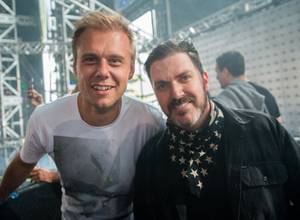It seems like just yesterday that Electric Daisy Carnival packed up its strobes and relocated from LA to the Las Vegas Motor Speedway. Five years later, the event has become synonymous with our city, and the mega-rave’s booming popularity has, for the most part, been a success for Las Vegas and EDC promoter Insomniac. June’s edition drew an estimated 135,000 nightly attendees, while last year’s festival injected an unprecedented $337.8 million into the local economy.
But the partnership’s future is uncertain. As the fest’s final sets ended, so did its five-year contract with the Speedway (no word on whether an extension or new deal has been inked). Despite its success, keeping the party in Las Vegas isn’t a given. Insomniac balked at recent reforms to Nevada’s Live Entertainment Tax that would have the promoter paying as much as $4 million in additional taxes to host EDC here. Reps called the tax “detrimental,” saying it could push them into the red and force a move.
Meanwhile, the death of a fan at this year’s event, combined with a spike in medical calls spurred by triple-digit temperatures, have raised some of the same health and safety concerns that drove EDC out of LA. Considering EDC is the size of a small city, some of these problems are unavoidable. But if moving the fest offers some solutions, it also means taking a risk with fans. Despite the turmoil, many who attended this year’s event say Las Vegas is part of the draw.
“It’s really the best spot to have it at,” said Silbia, a 21-year-old attendee from Whittier, California. “They use the space so well, and they know just how to place everything. I can’t think of another venue big enough to be this great. EDC is a party, Vegas is a party, so why not have it in Vegas?” Her companion Ryan was less amenable, saying he’d gladly trade spectacle for a cooler locale.
Others said EDC’s destination location supports a healthy, positive environment. “You haven’t seen this kind of love in a long time,” said 24-year-old veteran raver Alaina Weeks of Morro Bay, California. “Because you have to make a journey, people appreciate it all much more.”
Ethan Elmendorf, 28, added that the Vegas scene was much friendlier than at similar events he’d experienced in California, particularly in the “harsh crowd” of LA. Both he and Weeks said they’d be less inclined to return to EDC if the festival moved back to Southern California, though they’d be open to a move north. Ultimately, it’s the “vacation vibes” of EDC Las Vegas—heat waves and all—that they hope are here to stay.
The same could be said for the city’s nightlife industry. While Las Vegas’ EDM scene was well on the rise before EDC touched down, its new role as home base for the world’s largest dance music festival has been a boon for business, cementing the city as a global mecca for dance music.
“As a promoter, having an entire week where the whole scene visits to your home turf to party is sort of like winning the lottery,” said local promoter Joe Borusiewicz, who helps produce dozens of Las Vegas dance music events year-round, including several EDC Week events with Insomniac sister brand Bassrush. “Because of EDC and EDC Week, we've been able to put together a ton of great shows that never would've happened in Vegas otherwise.”
While Strip megaclubs in a constant rotation of top-tier DJs likely wouldn’t feel the burn, smaller operations and other businesses that don’t typically have nightlife revenue to fall back on—hotels, restaurants and transportation services, for example—would suffer in the festival’s absence. “I don't see Omnia shutting its doors if Insomniac decides to take the fest back to SoCal,” Borusiewicz said. “[But] for small- to mid-size companies and even the Strip properties without 7,000-capacity money machines, losing a big week of business hurts. ... I would equate it to losing any other major event in Vegas, like a title fight or something to that degree.”
Even if EDC opts to uproot, Las Vegas remains primed for a similar event to take its place. With competitors like SFX Entertainment and AEG eagerly encroaching on the EDM events market, and operators keen to make use of new events spaces like the MGM Resorts Village, the city likely wouldn’t remain dance-fest-less for long. High production costs and overhead taxation may be risks, but they’re also increasingly part of the baseline necessary to keep up in the saturated markets of Las Vegas and beyond.
Borusiewicz said that while he’d hate to see EDC and its satellite celebrations go, he also doesn’t think a move is likely.
“I do not think anyone will allow it to happen when it comes down to it. I think if it really comes down to, ‘Fix this or we leave town,’ somebody will blink,” he said. “When you stack up a few hundred million injected into the local economy from the event versus a few million in taxes, I just don't think it makes sense.”








